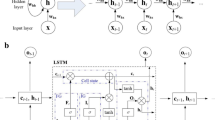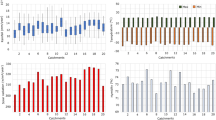Abstract
With the rapid development of Artificial Intelligence (AI) technology, the Long Short-Term Memory (LSTM) network has been widely used for forecasting hydrological process. To evaluate the effect of training data amount on the performance of LSTM, the study proposed an experiment scheme. First, K-Nearest Neighbour (KNN) algorithm is employed for generating the meteorological data series of 130 years based on the observed data, and the Soil and Water Assessment Tool (SWAT) model is used to obtain the corresponding runoff series with the generated meteorological data series. Then, the 130 years of rainfall and runoff data is divided into two parts: the first 80 years of data for model training and the remaining 50 years of data for model verification. Finally, the LSTM models are developed and evaluated, with the first 5-year, 10-year, 20-year, 40-year and 80-year data series as training data respectively. The results obtained in Yalong River, Minjiang River and Jialing River show that increasing the training data amount can effectively reduce the over-fittings of LSTM network and improve the prediction accuracy and stability of LSTM network.









Similar content being viewed by others
References
Dami S, Esterabi M (2021) Predicting stock returns of Tehran exchange using LSTM neural network and feature engineering technique. Multimed Tools App 80(13):19947–19970
Dikshit A, Pradhan B, Huete A (2021) An improved SPEI drought forecasting approach using the long short-term memory neural network. J Environ Manage 283:111979
Dilip KR (2021) Long short-term memory networks to predict one-step ahead reference evapotranspiration in a subtropical climatic zone. Environ Process 8(2):911–941
Hinton GE, Salakhutdinov RR (2006) Reducing the dimensionality of data with neural networks. Science 313(5786):504–507
Hochreiter S, Schmidhuber J (1997) Long short-term memory. Neural Comput 9(8):1735–1780
Hu C, Wu Q, Li H, Jian S, Li N, Lou Z (2018) Deep learning with a long short-term memory networks approach for rainfall-runoff simulation. Water 10(11)
Huang Z, Hasan A, Shin K, Li R, Driggs-Campbell K (2021a) Long-term pedestrian trajectory prediction using mutable intention filter and warp LSTM. IEEE Robot Autom Lett 6(2):542–549
Huang Z, Wang J, Pi L, Song X, Yang L (2021b) LSTM based trajectory prediction model for cyclist utilizing multiple interactions with environment. Pattern Recognit 112:107800
Jiang Y, Liu X (2021) Image/video aesthetic quality management based on fusing 3D CNN and shallow features. Futur Gener Comput Syst 118:118–123
Lall U, Sharma A (1996) A nearest neighbor bootstrap for resampling hydrologic time series. Water Resour Res 32(3):679–693
Lin Z, Chen AY, Hsieh S (2021) Temporal image analytics for abnormal construction activity identification. Automat Construct 124:103572
Liu X, Yang M, Meng X, Wen F, Sun G (2019) Assessing the impact of reservoir parameters on runoff in the Yalong River Basin using the SWAT model. Water 11(4):643
Mao G, Wang M, Liu J, Wang Z, Wang K, Meng Y, Zhong R, Wang H, Li Y (2021) Comprehensive comparison of artificial neural networks and long short-term memory networks for rainfall-runoff simulation. Phys Chem Earth Parts A/B/C 123:103026
Rahimzad M, Moghaddam Nia A, Zolfonoon H, Soltani J, Danandeh Mehr A, Kwon H (2021) Performance comparison of an LSTM-based deep learning model versus conventional machine learning algorithms for streamflow forecasting. Water Resour Manage 35(12):4167–4187
Wang W, Du Y, Chau K, Xu D, Liu C, Ma Q (2021a) An ensemble hybrid forecasting model for annual runoff based on sample entropy, secondary decomposition, and long short-term memory neural network. Water Resour Manage 35(14):4695–4726
Wang X, Wang Y, Yuan P, Wang L, Cheng D (2021b) An adaptive daily runoff forecast model using VMD-LSTM-PSO hybrid approach. Hydrol Sci J 66(9):1488–1502
Xu W, Jiang Y, Zhang X, Li Y, Zhang R, Fu G (2020) Using long short-term memory networks for river flow prediction. Hydrol Res 51(6):1358–1376
Yin H, Zhang X, Wang F, Zhang Y, Xia R, Jin J (2021) Rainfall-runoff modeling using LSTM-based multi-state-vector sequence-to-sequence model. J Hydrol 598:126378
Yin S, Xu W, Xiong Y, Tian Y, Zhao S, Chen S (2022) Hydrological model based on long short-term memory neural network and transfer learning. J Hydroelectr Eng (in Chinese)
Yu Y, Si X, Hu C, Zhang J (2019) A review of recurrent neural networks: LSTM cells and network architectures. Neural Comput 31(7):1235–1270
Funding
This study was funded by the National Natural Science Foundation of China (Grant No. 51709177, 51709108).
Author information
Authors and Affiliations
Contributions
All authors contributed to the study conception and design. Material preparation, data collection were performed by Wei Xu, model built by Anbang Peng, data analysis were performed by Xiaoli Zhang, figure drawn by Yuanyang Tian. The first draft of the manuscript was written by Anbang Peng and all authors commented on previous versions of the manuscript. All authors read and approved the final manuscript.
Corresponding author
Ethics declarations
Competing Interests
The authors have no relevant financial or non-financial interests to disclose.
Additional information
Publisher's Note
Springer Nature remains neutral with regard to jurisdictional claims in published maps and institutional affiliations.
Rights and permissions
About this article
Cite this article
Peng, A., Zhang, X., Xu, W. et al. Effects of Training Data on the Learning Performance of LSTM Network for Runoff Simulation. Water Resour Manage 36, 2381–2394 (2022). https://doi.org/10.1007/s11269-022-03148-7
Received:
Accepted:
Published:
Issue Date:
DOI: https://doi.org/10.1007/s11269-022-03148-7




